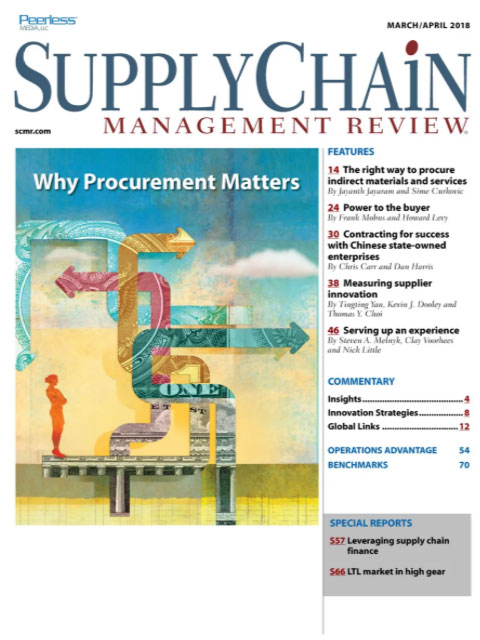Sorry, but your login has failed. Please recheck your login information and resubmit. If your subscription has expired, renew here.
March-April 2018
"Inflation creeps into U.S. Supply Chain.” So said the headline on a Wall Street Journal article I read this morning before writing this column. The Journal went on to write that U.S. companies are grappling with rising material and ingredient costs on top of pressure from higher wages—a potential double whammy— and noted that companies like Whirlpool and Ford have already issued warnings to the market. Browse this issue archive.Need Help? Contact customer service 847-559-7581 More options
Corporate responsibility practices, in particular “green” or sustainable practices and ethical business practices, continue to be of strategic importance to many organizations. Within the supply chain, organizations will often set standards for their corporate responsibility efforts and then pass those along to suppliers to ensure continuity.
APQC’s Open Standards Benchmarking® data in procurement indicates that more than half of organizations consider environmental factors in sourcing decisions to a very great extent, and over 60% of organizations consider ethical factors to a very great extent (Figure 1). Given these levels of consideration, it makes sense that organizations would want to ensure that their suppliers adhere to standards regarding sustainability.
Organizations that consider environmental factors in their sourcing reap benefits for their purchasing processes, according to APQC’s data. However, organizations can further benefit by ensuring that suppliers adhering to sustainability standards receive their business. Organizations that set consequences for applying non-compliant sourcing processes have an even greater procurement advantage. These results indicate that fully incorporating environmental and ethical goals into procurement processes yields performance benefits in addition to benefits to an organization’s reputation. This is further illustrated by the electronics organization Intel, which has deeply integrated its goals for corporate responsibility into its processes for selecting and monitoring suppliers.

This complete article is available to subscribers only.
Log in now for full access or start your PLUS+ subscription for instant access.
SC
MR
Sorry, but your login has failed. Please recheck your login information and resubmit. If your subscription has expired, renew here.
March-April 2018
"Inflation creeps into U.S. Supply Chain.” So said the headline on a Wall Street Journal article I read this morning before writing this column. The Journal went on to write that U.S. companies are grappling… Browse this issue archive. Access your online digital edition. Download a PDF file of the March-April 2018 issue.Corporate responsibility practices, in particular “green” or sustainable practices and ethical business practices, continue to be of strategic importance to many organizations. Within the supply chain, organizations will often set standards for their corporate responsibility efforts and then pass those along to suppliers to ensure continuity.
APQC's Open Standards Benchmarking® data in procurement indicates that more than half of organizations consider environmental factors in sourcing decisions to a very great extent, and over 60% of organizations consider ethical factors to a very great extent (Figure 1). Given these levels of consideration, it makes sense that organizations would want to ensure that their suppliers adhere to standards regarding sustainability.
Organizations that consider environmental factors in their sourcing reap benefits for their purchasing processes, according to APQC's data. However, organizations can further benefit by ensuring that suppliers adhering to sustainability standards receive their business. Organizations that set consequences for applying non-compliant sourcing processes have an even greater procurement advantage. These results indicate that fully incorporating environmental and ethical goals into procurement processes yields performance benefits in addition to benefits to an organization's reputation. This is further illustrated by the electronics organization Intel, which has deeply integrated its goals for corporate responsibility into its processes for selecting and monitoring suppliers.
SC
MR


Latest Supply Chain News
Latest Podcast

 Explore
Explore
Procurement & Sourcing News
- Strengthening customer fulfillment: Building a strategic stakeholder network
- Trump picks former Wisconsin congressman Sean Duffy for DOT secretary
- Made in Mexico, manufactured by China
- Retail sales see gains in October, reports Commerce and NRF
- Geopolitical readiness in supply chains: Strategic challenges for leaders
- With capacity to spare, logistics real estate demand remains subdued
- More Procurement & Sourcing
Latest Procurement & Sourcing Resources

Subscribe

Supply Chain Management Review delivers the best industry content.

Editors’ Picks





